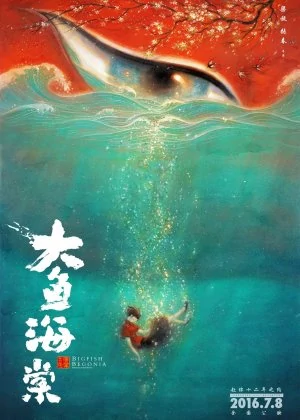Big Fish and Begonia
Movie details

With China feverishly looking for a way to establish itself in the international film scene, it was only a matter of time before they would give animation a go. Somewhat surprisingly, they looked further east (namely Japan) instead of trying to mimic Pixar/Disney's success. The result is Big Fish and Begonia [Dayu Haitang], a monumental fantasy project that combines Chinese folklore with elaborate fantasy elements into one of the most beautiful fantasy productions I've seen.
![screen capture of Big Fish and Begonia [Dayu Haitang]](/thumbs/img/articles/1200xauto/big-fish-begonia-1.webp)
Big Fish and Begonia isn't China's first ever animation film of course, but earlier projects never managed to showcase the scale and skill on display here. Dante Lam tried it a couple of times, Tsui Hark had a go at it, but these are live action directors crossing over into a field that isn't really their own. Still, people like Xuan Liang and Chun Zhang didn't just arrive out of nowhere. For years now, Japan has been outsourcing some of its animation work to countries like China and South-Korea, so even though they've lacked the directors so far, they were still able to master the techniques.
While watching Big Fish and Begonia, I was often reminded of Miyazaki's Spirited Away. Not so much because it's a blatant Ghibli copy or it contains any direct references to Miyazaki's work, but because it has a very similar balance of local folklore and fantasy elements that fortify each other and combine into rich and elaborate lore that propels the film forward. It's an ideal mix of influences and creativity for a fantasy film, though it might alienate some people who prefer more cliched and established fantasy setups.
The story revolves around Chun, a young girl who lives in a world lodged between the worlds of humans and gods. The people in Chun's world control the natural forces in the human world, but before they can do so they have to go through a 7-day coming of age ritual held once a year. To successfully complete the ritual they have to visit the human world and get back in time. On her quest Chun runs into a young boy who rescues her from drowning. While his actions allow Chun to return to her own world, the boy himself doesn't survive the rescue. Struck with guilt and grief, Chun vows to do what she can to revive the boy, even if she has to pay with her own life.
![screen capture of Big Fish and Begonia [Dayu Haitang]](/thumbs/img/articles/1200xauto/big-fish-begonia-2.webp)
Visually this is quite something else. There's a strong anime vibe present, though it clearly leans towards the more serious art styles. There is some Ghibli, some Shinkai, but ultimately it's very much its own thing. Gobsmackingly beautiful backgrounds, rendered with lush detail, set the stage and paint a fantastical setting, while the clean character designs and rich animation add to the finesse and create a vibrant animated world. The CG is also used to great effect, helping out during the more explosive scenes while blending in perfectly with the more traditional art style. This clearly was a very talented crew who knew what they were doing and had the proper (crowd)funding to bring their vision to life.
The score is also pretty spectacular, though it's nothing too original or out there. In fantasy films there's usually a thin line between epic grandeur and cheesy kitsch and Big Fish and Begonia knows how to walk that line perfectly. There are some real stand-out pieces that add a lot of weight to the more emotional moments, though usually by toning down the soundtrack rather than amping it up. The dub too is of high quality, as long as you make sure you get the original Chinese/Mandarin one. There's an English dub to please a less adventurous international audience, but it takes away from the overtly Chinese vibe that runs throughout the film.
![screen capture of Big Fish and Begonia [Dayu Haitang]](/thumbs/img/articles/1200xauto/big-fish-begonia-3.webp)
Big Fish and Begonia's biggest asset may also be its biggest weakness, depending on what you expect from a fantasy film. While the fantastical elements are lush and abundant, they can also be quite alien and overwhelming. If you can't distinguish between the Chinese folklore and the core fantasy, it might be a bit much to take in, especially since the film is more show than tell. The film doesn't go through great lengths to explain every single piece of lore, which means there are moments that you'll be asked to fill in the gaps yourself. It's no doubt the way I prefer my fantasy films, but not everyone is going to feel the same.
Even so, if you're starting to lose your grip on the story, there's still the beautiful world and astounding animation to get lost in. Big Fish and Begonia is an absolute stunner, an audiovisual experience that dragged me into its world and didn't let go until the final frame faded and the last note died. If there's any justice in this world, it should provide an amazing boost to the Chinese animation scene, though with China's struggles to break through internationally, that remains to be seen. At least we'll always have this film to treasure, well recommended if you're looking for a standout fantasy animation.